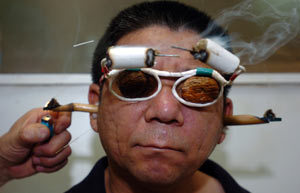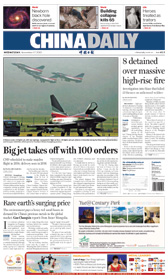Workers suffering from information overload
Updated: 2010-11-22 14:44
By Zhou Siyu (China Daily)
Bombarded with calls
Telephone calls are also causing a problem. According to the survey, Chinese white collar workers prefer communicating by phone, while their western counterparts favor e-mails.
More than 40 percent of Chinese white collar workers chose mobile phones as the preferred way to communicate important and urgent business matters, while 42 percent in the US, 67 percent in Britain and 62 percent in South Africa favored e-mails, according to the survey.
Wang Lei, 28, works as the assistant to the president at a private equity fund company in Beijing.
He receives a limited number of e-mails every day but his phone is constantly in use.
Talking saves time and energy over the alternative of clicking, reading and replying to e-mails, but phone calls are more distracting, he said.
"Phone calls tend to add to the immediacy of the business being talked about. More often than not, I will put away a much more important task at hand and start the other. Undoubtedly, this has upset the priority of my work and severely affected my efficiency," Wang added.
Solution? Not yet
Many hands make light work. With more recruits, interns, and assistants, information intensity will be diluted within a company.
Yet, when the organization expands beyond a certain extent, the additional labor force and managerial costs will offset the improvement in information management.
Another approach is to integrate information management technologies into the overall management mechanism. Many companies start with providing staff with better computers, better Internet access and more advanced gadgets.
"For example, staff members above a certain level in our company will be provided with a blackberry phone for easier access to their e-mails. The company has also organized many lectures on efficient ways of e-mail management. All in all, I do not see the current information flow is causing any trouble," said Sima Hantang, a senior officer in a US-based Fortune 500 logistics company in Shanghai.
In China, 62 percent of white collar workers acknowledge their companies have already employed modern information management technologies, compared with only 25 percent in the US, the survey showed.
Yet, most Chinese white collar workers also think their companies can do more. Eighty-three percent of them think their companies should upgrade computer hardware and management technologies and 83 percent ask for more lectures on information management - much higher than the average in the other four countries.
"The survey does not afford much detailed analysis because of the limited number of samples. We will expand the scope of the survey and focus on first-tier cities in China in the near future," said Long.
Paper's Digest

China bags Asiad team tennis title after 24 yrs
Wimbledon semifinalist Li Na led host China to capture the team tennis title on Tuesday at the Asian Games, accomplishing her Asiad tour with three consecutive victories.
China rate rises no panacea to curb inflation: PBOC adviser
Specials

Russian possessed with TCM
Born into a family of doctors, Maxime became interested in Traditional Chinese Medicine (TCM) at the age of 12, after hearing about TCM theories such as health preservation and recuperation.

Acupuncture takes stab at UNESCO list
Acupuncture and Peking Opera have been selected as candidates for UNESCO intangible cultural heritage status.

The wedding coach comes back to life
A groom carries his bride from a wedding coach in Xuchang, Henan province, Nov 11, 2010. Produced a local factory, various original hand-made wedding carriages were displayed on the streets, attracting young people chasing fashion and an environment-friendly lifestyle.
